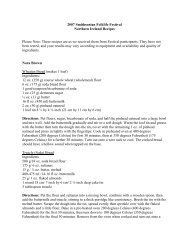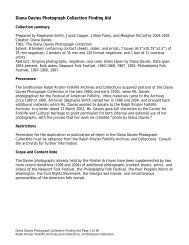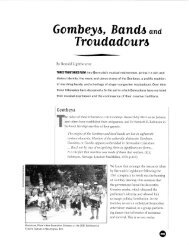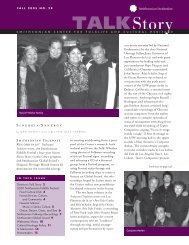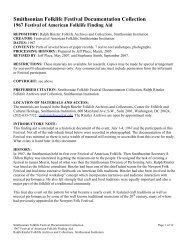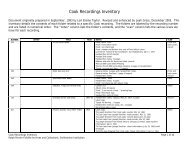Who Owns Traditional Medical Knowledge? - Smithsonian Center ...
Who Owns Traditional Medical Knowledge? - Smithsonian Center ...
Who Owns Traditional Medical Knowledge? - Smithsonian Center ...
Create successful ePaper yourself
Turn your PDF publications into a flip-book with our unique Google optimized e-Paper software.
MAKING HERITAGE LEGIBLE 187<br />
Merryman, John Henry. “Two Ways of Thinking About Cultural Property.” American Journal of International<br />
Law 80 (1986): 831–835.<br />
———. “Cultural Property Internationalism.” International Journal for Cultural Property, 12, no. 1,<br />
(February 2005).<br />
Mohan Ram, H.Y. “On the English Edition of Hortus Malabaricus by K.S. Manilal (2005).” Current<br />
Science 89, no. 10 (2005): 1672–1680.<br />
Mitchell, Timothy. Rule of Experts: Egypt, Techno-Politics, Modernity. Berkeley: The University of California<br />
Press, 2002.<br />
Nicholas, George P. and Kelly P. Bannister. “Copyrighting the Past Emerging Intellectual Property<br />
Rights Issues in Archeology.” Current Anthropology 45, no. 3 (2004): 327–350.<br />
Parry, Bronwyn. Trading the Genome: Investigating the Commodification of Bio-Information.NewYork:<br />
Columbia University Press, 2004.<br />
Petryna, Adriana. Life Exposed: Biological Citizens after Chernobyl. Princeton, NJ: Princeton University<br />
Press, 2003.<br />
Posey, Darrell A., and Graham Dutfield. Beyond Intellectual Property: Toward <strong>Traditional</strong> Resource<br />
Rights for Indigenous Peoples and Local Communities. Ottawa: International Development Research<br />
Centre, 1996.<br />
Rapp, Rayna, Deborah Heath, and Karen-Sue Taussig. “Genetic Citizenship.” In Companion to the<br />
Handbook of Political Anthropology, edited by David Nugent and Joan Vincent. Oxford: Blackwell,<br />
2003.<br />
Reddy, Sita. Reinventing <strong>Medical</strong> Traditions: The Professionalization of Ayurveda in America. Unpublished<br />
dissertation, University of Pennsylvania, 2000.<br />
———. “The Politics and Poetics of Magazine Medicine.” In Robert Johnston, ed. Politics of Healing:<br />
A History of Alternative Medicine in Twentieth-Century North America, Routledge, 2003.<br />
———. “Asian Medicine in America: The Ayurvedic Case.” Annals of the American Academy of Political<br />
and Social Science 583 (2002): 97–121.<br />
———. “The Memory of Divine Objects: Remembrance and Repatriation” (For the <strong>Smithsonian</strong><br />
Material Culture Forum on The Remembrance of Things, How Museums and Memory Shape One<br />
Another, held September 2005). Material Matters 54 (June 2006): 10–12.<br />
Report of the Department of the Ayurveda, Yoga & Naturopathy, Unani, Siddha and Homeopathy<br />
(AYUSH), Ministry of Health and Family Welfare, Government of India, 2003.<br />
Robbins, Bruce, and Elsa Stamatopoulou. “Reflections on Culture and Cultural Rights.” South Atlantic<br />
Quarterly 103, no. 2/3 (2004): 227–259.<br />
Root, Deborah. Cannibal Culture: Art, Appropriation and the Commodification of Difference. Boulder,<br />
Colorado: Westview Press, 1995.<br />
Rose, Nikolas, and Carlos Novas, “Biological Citizenship.” In Global Assemblages: Technology, Politics,<br />
and Ethics as Anthropological Problems, edited by Aihwa Ong and Stephen J. Collier, 439–463. Oxford:<br />
Blackwell, 2005.<br />
Sarai Reader 01: The Public Domain. New Delhi and Amsterdam: Sarai Media Collective, 2001.<br />
Safrin, Sabrina. “Hyperownership in a Time of Biotechnological Promise: The International Conflict<br />
to Control the Building Blocks of Life.” American Journal of International Law, 98, no. 4 (2004):<br />
641–685.



